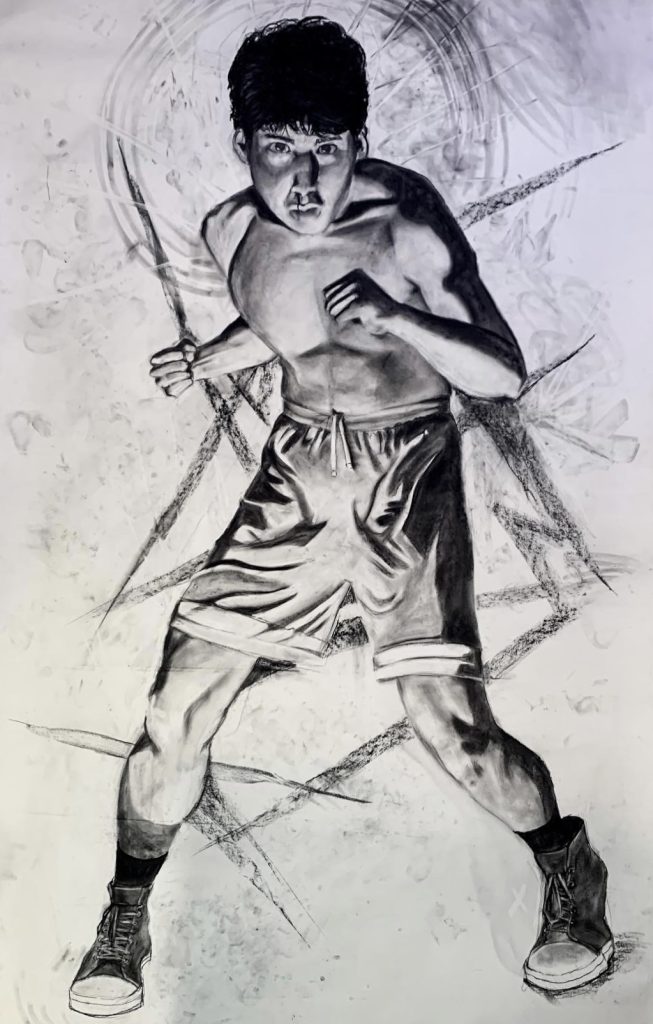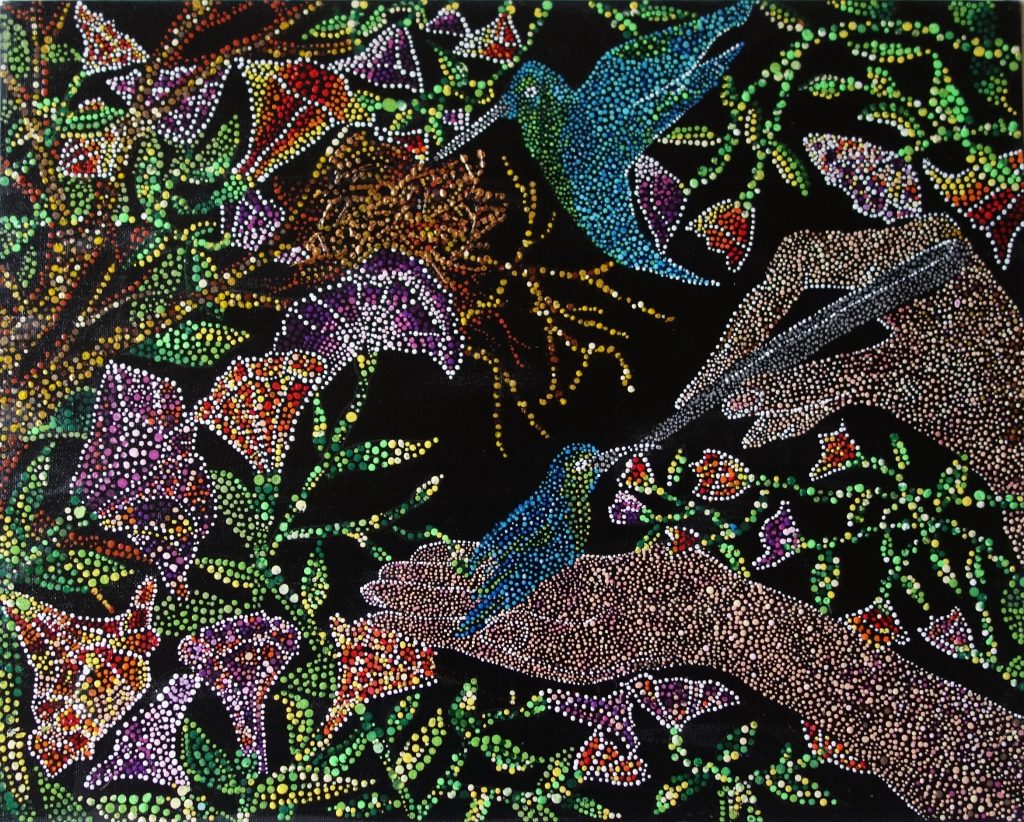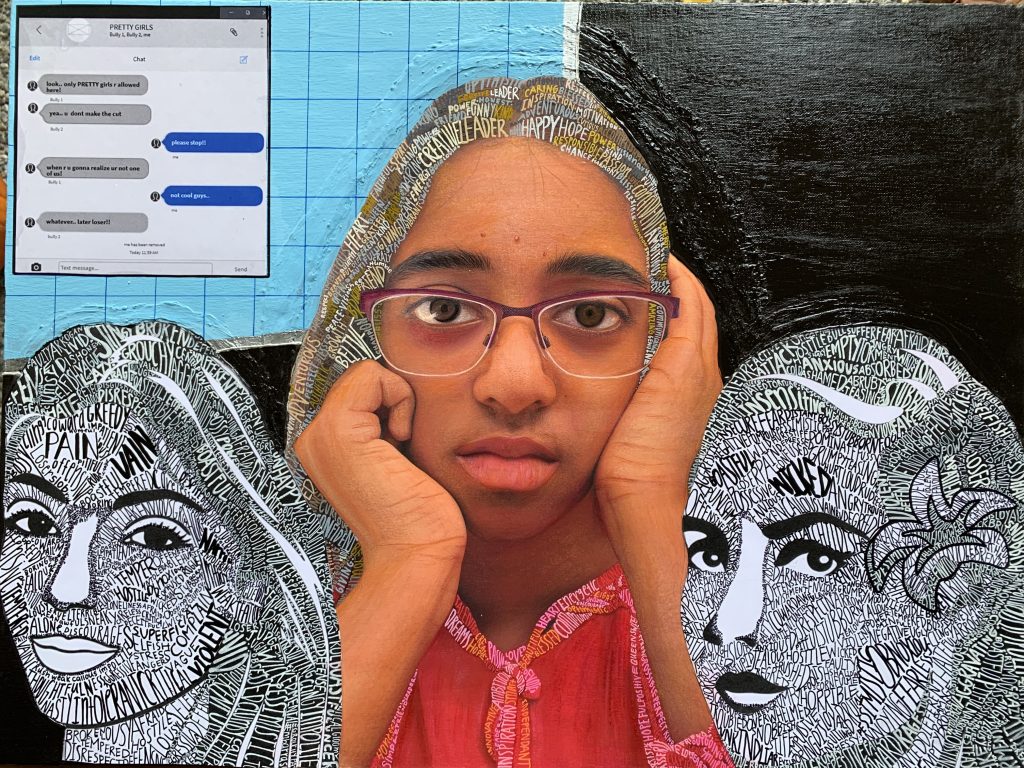
Erick Buendia is an artist from Washington DC who specializes in painting and filmmaking. He posts his artwork on Instagram @Buendia_draws. He is currently pursuing a career in Film at Wesleyan University.
Literary Journal for Young Writers
By Erick Buendia
By Maya Krishnan



Maya Krishnan is a tenth grader at Skyline High School, in Sammamish, WA.
She has been learning art from Neha Parikh since the age of six, and has always found it to be a wonderful medium to express her emotions, and her perception of the world around her.
By Elsa Lyons
We thought we would die if the water
swallowed us. We preferred to fight
many-headed monsters at daybreak
than spiral to the coral-veined heart
of our fears.
We thought we would die. Then we grew
gills. Our ship broke down and we let it
let water waltz with our shadows,
let schools of fish ripple our schools
of thought.
I met Scylla and I kissed her; my scars
fluttered open, and I could see
out of them.
Elsa H. Lyons is a young writer, dancer, and student of the earth. Her work has been recognized by the Alliance for Young Artists & Writers. She lives in the city and the country, in the world and in herself, and in the spaces in between.
By Christ Keivom
I try to explain what you’re like and I do it the way Proust
describes rain: musical, innumerable, universal. Everything is reminiscent of you.
A face in each moving car. A strand of hair in every dish. A rustling of leaves
Or wings or pages turning. A footstep on the winding road, which is either coming or going.
I have forgotten which already. Lately, I’m always in between—you and the next thought
of you. In the morning, before my feet touch the floor my mind reaches for you.
In the night, you are the charm of arms, warm as the kiss of an open mouth.
Whatever is absent in me, is present in you. Whatever is intolerable about me,
is made tolerable through you. Yet, it’s strange we suffer in spite of this!
The truth is, we are only hints of dust or one hint of dust.
Who’s to say we’ll still be alive when anyone is reading or will
ever read this poem. Time grows life inside the body.
And life kills by growing time inside the body. What else is there to say?
Death like love can never be prepared for, is instant and permanent.
Everything will end and when it ends. I know where I want to be,
in love, in love, in love…
Christ Keivom (he/him), is currently pursuing his master’s in English Literature from Delhi University. His work has previously appeared in Novus Literary Arts Journal, Mulberry Literary, Monograph Mag, Write now lit, The Chakkar, Farside Review, Spotlong Review, Agapanthus Collective, and Native Skin to name a few.
By Haile Espin
an instant biscuits package found at the very back of a failing refrigerator / eyelashes on my baby’s cheek that I swipe off, and hand to him to make a wish / the h sound the letter x makes in Spanish / the beauty mark underneath my ear / enchiladas topped with mole, queso fresco, and sour cream / lopsided, ugly chocolate cupcakes that my brothers devour in a minute / the social studies PowerPoints kids like me saw, when we didn’t make it into the Academically Gifted program / the tear stains on the poetry book I first saw myself in / the banda, cumbia and reggaeton blasting from my phone / the smile on my babies’ faces when I surprise them with hot cocoa and pan de dulce after reprimanding them / Corona bottles littering the house after a party / the worn out picture my uncle carries of his boys that he shows to everyone whenever he can / my papi’s neon construction vest / my grandma’s passed down chocoflan recipe / the second and third generations, that hold onto our roots as tightly as possible / the sandy, rocky trail of pulgas / the mamalonas driven without a license / the medallas of la Virgen de Guadalupe girls wear around their necks / my people, mi gente, with their gorgeous, bronze hands, and gentle accents
Haile Espin is a Mexican-American writer from NC. Her work has been published in The Louisville Review’s 2022 Spring Edition, Apricity Magazine, Valiant Scribe Literary Journal and elsewhere.
By Samuel Adeyemi
If only I could burn the echo to kill the
evidence of sound. I mean, my mother’s
voice over the phone: I was admitted to
the hospital. I didn’t want to tell you.
As if delay would not break me still. As if
it would separate venom from sting, leaving
only the spider’s sharp bore.
I know exactly what she meant, why she
didn’t tell me about the illness. The logic:
look, son, I am alive. Do not worry about me.
But I am stubborn in my compassion, so, of
course, I worried. Feverish all week, I was
burdened by the gravity of powerlessness.
It would weigh my bruised heart, and then
outweigh it.
Despite all of its glory, the body’s ability will,
in the end, fail us. Accepting this truth may
or may not make a difference.
In times like these, the truth troubles me.
I have no agency to deliver the people I love.
My volition ends with the body’s limit.
I, physician of nothing. No antidote to erase
the wound. If I could, I would
erase the phone call, peel back
my mother’s voice reporting her illness,
peel back the illness till it forgets her body,
origami the wound for its paper-boat escape.
Indeed, I could build a house
full of conditions. But in the end, everything
crumbles to the reality of the body.
Look at my hands: hands.
No alchemy in the veins to repair. No blood
pure enough to wash clean affliction.
Lead me to a river that cleanses every plague.
A sea to reanimate the cell’s grey wilt.
Where are you?
O river. O saint of water.
Blue latitude. Wet miracle.
Samuel A. Adeyemi is a writer and editor from Nigeria. A Best of the Net Nominee and Pushcart Nominee, he is the winner of the Nigerian Students Poetry Prize 2021. His chapbook, Rose Ash, was selected by Kwame Dawes and Chris Abani for the New-Generation African Poets chapbook box set, 2023. His works have appeared or are forthcoming in Palette Poetry, Frontier Poetry, 580 Split, Strange Horizons, Chestnut Review, Agbowo, Isele Magazine, Brittle Paper, Jalada, and elsewhere.